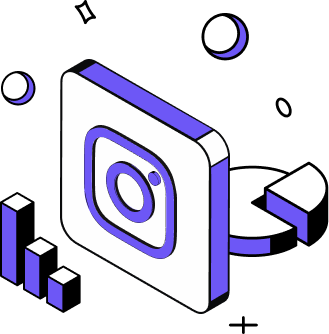FREE social media tools to analyze performance
Stop guessing what works! See what posts resonate with your followers the most so you can create more of what they love and boost engagement and reach across your accounts

FREE Social Media Engagement Rate Calculators
FREE Most Liked Posts Analyzer
FREE Social Media Analytics
FREE Social Media Head-to-Head Comparison
FAQs about social media tools
Got a question? We've got answers.
What are social media marketing tools?
Social media marketing tools are applications or platforms designed to help businesses manage, analyze, and optimize their presence across social media channels. These tools can assist with scheduling posts, monitoring brand sentiment, automating engagement, creating content calendars, and providing analytics to evaluate what’s working in a social strategy.
What can social media analytics tools help you measure when assessing campaign results?
Social media analytics tools measure a variety of metrics, including:
- Reach (how many people saw your posts)
- Impressions (how often your content appeared)
- Engagement (likes, shares, comments, clicks)
- Follower growth
- Click-through rates (CTR)
- Conversion rates (leads or sales generated)
- Audience demographics and behaviors
- Top-performing content and post types
- Reach (how many people saw your posts)
- Impressions (how often your content appeared)
- Engagement (likes, shares, comments, clicks)
- Follower growth
- Click-through rates (CTR)
- Conversion rates (leads or sales generated)
- Audience demographics and behaviors
- Top-performing content and post types
How to spy on competitors on social media: tools and techniques
To analyze competitors on social media, use competitor analysis tools like Socialinsider that track their content, engagement, audience growth, and campaign performance. Techniques include:
- Benchmarking your performance against theirs
- Analyzing their content strategy and posting frequency
- Monitoring their top-performing posts and engagement rates
- Tracking influencer partnerships and sentiment around their brand
- Benchmarking your performance against theirs
- Analyzing their content strategy and posting frequency
- Monitoring their top-performing posts and engagement rates
- Tracking influencer partnerships and sentiment around their brand
What are social media analytics tools?
Social media analytics tools are software applications that collect, monitor, and analyze data from social media platforms. They provide insights into performance metrics, audience behaviors, content effectiveness, campaign ROI, and more, enabling data-driven decisions to optimize social strategies.
Which is not among the metrics presented as important to social media analytics?
Metrics often considered less important or "vanity metrics" include:
- Klout score (now defunct and widely regarded as unreliable)
- Raw number of followers or fans (without engagement context)
- Number of social shares (can be misleading if not tied to actual traffic or conversions)
These metrics may not reflect true campaign effectiveness or business impact.
- Klout score (now defunct and widely regarded as unreliable)
- Raw number of followers or fans (without engagement context)
- Number of social shares (can be misleading if not tied to actual traffic or conversions)
These metrics may not reflect true campaign effectiveness or business impact.
How to understand social media analytics
To understand social media analytics:
- Identify your goals (brand awareness, engagement, conversions)
- Track relevant KPIs (reach, engagement, CTR, conversion rate)
- Analyze trends over time and compare against benchmarks or competitors using social media analytics tools like Socialinsider
- Use visualizations (charts, graphs) for clarity
- Contextualize data with insights and actionable recommendations
- Connect analytics to business objectives for meaningful reporting
- Identify your goals (brand awareness, engagement, conversions)
- Track relevant KPIs (reach, engagement, CTR, conversion rate)
- Analyze trends over time and compare against benchmarks or competitors using social media analytics tools like Socialinsider
- Use visualizations (charts, graphs) for clarity
- Contextualize data with insights and actionable recommendations
- Connect analytics to business objectives for meaningful reporting
Can Google Analytics track social media?
Yes, Google Analytics can track social media by measuring website traffic, user behavior, and conversions originating from social platforms. It identifies referral sources, engagement, and campaign performance. For best results, use UTM parameters on shared links to ensure accurate attribution of traffic and conversions from social media.
However, Google Analytics cannot track metrics like follower count, likes, comments, and shares. For this, you will need to use a social media analytics tool like Socialinsider.
However, Google Analytics cannot track metrics like follower count, likes, comments, and shares. For this, you will need to use a social media analytics tool like Socialinsider.
How to present social media analytics
Present social media analytics by:
- Setting clear objectives and KPIs
- Collecting and organizing relevant data
- Using visuals (charts, graphs) to highlight key trends
- Providing context and insights for the data
- Tailoring reports for different stakeholders (executives vs. marketing teams)
- Connecting social performance to business goals
- Making clear, data-driven recommendations for next steps
- Setting clear objectives and KPIs
- Collecting and organizing relevant data
- Using visuals (charts, graphs) to highlight key trends
- Providing context and insights for the data
- Tailoring reports for different stakeholders (executives vs. marketing teams)
- Connecting social performance to business goals
- Making clear, data-driven recommendations for next steps
Which social media management platform has the best analytics for B2B?
For B2B, Socialinsider stands out for its comprehensive analytics, benchmarking, and competitor analysis features tailored for both agencies and brands. It enables users to compare performance across channels, monitor engagement, reach, impressions, and follower growth, and generate in-depth reports quickly. Socialinsider also offers AI-driven insights on content pillars, post tagging for campaign analysis, and white-label reporting, making it especially valuable for B2B teams that need actionable data and efficient reporting workflows.
Ready to improve your social media strategy with real-time insights?
Get strategic insights, analyze the social performance across all channels, compare metrics from different periods, and download reports in seconds.



